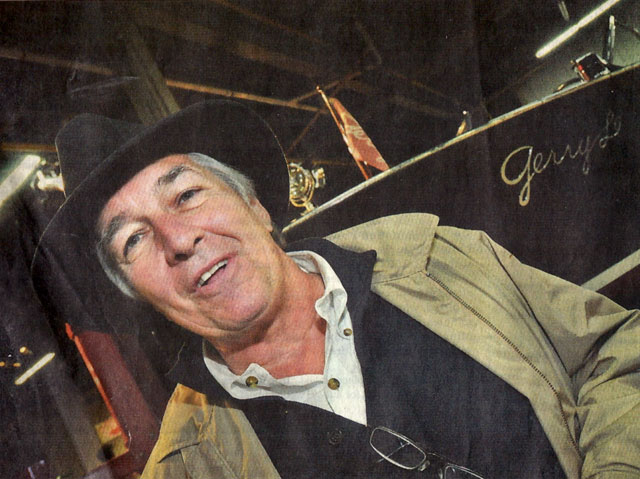By Kelly Westhoff, Lakeshore Weekly News
F. Todd Warner, who is well-known in the Lake Minnetonka area as the founder of Mahogany Bay – a Mound-based company that specializes in the sale, storage, transportations and restoration of wooden boats – put his personal collection of wooden boats up for auction.
Before the auction, Warner’s collection was widely considered one of the largest and most valuable collections of vintage wooden boats in the world.
Nearly 130 boats were auctioned, netting about $4 million.
The collection included the “Gerry Lo,” an antique runabout that Warner called “one of the premier boats at the show.”
The “Gerry Lo” was custom designed and built by Dingle Boat Works of St. Paul for Frank Wolcott Griswold, who named the boat after his daughters, Geraldine and Lois Mary.”
“In 1929, when the boat was built, it cost $25,000, which was an astounding sum at the time. Upon its launch on Lake Minnetonka that same year, it earned the reputation of being, Warner said, “the fastest boat on the lake.The ‘Gerry Lo’ is a real piece of Minnesota history,” said Warner, who, until Saturday’s auction, had only been the boat’s second owner. It sold at auction for $313,500 to a bidder from Nisswa.
Warner, who grew up in Hopkins and spent his childhood summers boating on Lake Minnetonka, started his boat restoration business in 1974.
As his business grew, he acquired more and more boats, often traveling great distances to find treasures.
Some of those boats he bought for customers at their request. Some he restored and later sold. Others he restored and kept for himself. And still others he never got around to refinishing.
At Saturday’s auction, 127 boats were up for sale. Warner called some of those boats “great values.” Because these boats had not yet been refinished, he expected they would ultimately sell for a lower price point. Buyers for these boats, Warner said, would probably be people who wanted to restore a boat on their own.
Also for sale were fully refinished wooden boats that Warner suspected would sell at a higher price point. These boats, while pretty and stylish, would allow a buyer who wasn’t interested in the refinishing process to “get on the water right away,” he said.
A number of the boats up for auction were expected to fetch large sums. Among them was a boat called “Sugar Lady.”
Built in 1932, the “Sugar Lady,” Warner said, “is probably the most well-known Chris-Craft in the world.” It sold for $302,500.
Roughly 1,000 bidders attended Saturday’s event in Winsted, which is about 45 minutes west of the Lake Minnetonka area. Including spectators, the auction drew about 5,000 people.
Although Warner placed a high number of boats for auction, he did not sell his entire fleet.
His flagship boat, “Posh,” which is well-recognized on Lake Minnetonka, was not for sale, nor was “Tempo,” another one of his well-recognized of his boats. He also held on to a few boats that had sentimental family meaning.
Yet, he admitted, “I’m selling the lion’s share.”
“I had hoped to keep all my boats together,” he said. Warner had envisioned creating a wooden boat museum, “but the economic times won’t allow it,” he said.
Proceeds from the sale, Warner said, will help Mahogany Bay stay operational. “We’ll continue in business,” he said, “we’ll just do it with a lot less storage.”
Warner partnered with Mecum Auctions, an auction company based in Illinois, to run the event.
The idea of a holding a public auction, Warner said, came to him at the beginning of this year when he learned about another successful, although much smaller, public auction of wooden boats.
A public auction of wooden boats, Warner thought, might generate a large enough buzz to bring some new blood to the hobby.
“If everything sells privately, nobody knows what the market value is,” he said. At a public auction, however, one could get a better sense for the true market value of each boat.
If collectors outside the wooden boat market, like classic car enthusiasts, could see how valuable wooden boats could be, perhaps they would get excited and join the bidding, Warner hoped.
For this reason, none of the items at Saturday’s auction had been put on reserve, meaning a minimum price had not been named for any boat. This was a gamble, but Warner was open to whatever the dice might roll.
When he realized his dream of a wooden boat museum would not come to fruition, he confessed, “I had to adjust. This whole process has been a lesson in letting go.”
Besides, he said, as he had yet to get around to restoring all of his boats, the auction would allow others a chance to participate in the hobby and give new life to the boats.
“My ultimate hope is that more boats will get saved,” Warner said.
“Every boat is a time capsule,” he said. “It carries the stories of people, of an era, of relationships. I think it’s important that we share these stories,” he said.
Wooden boats, Warner said, are “floating sculptures.”
“There is something special about a wooden boat,” he said. “More people need to understand the soul of these boats, to understand how romantic they are.”
“If I can wake that up in another 100, or even another 10 people, I will feel proud. We need more people to carry on the stories and traditions of these boats,” Warner said.

